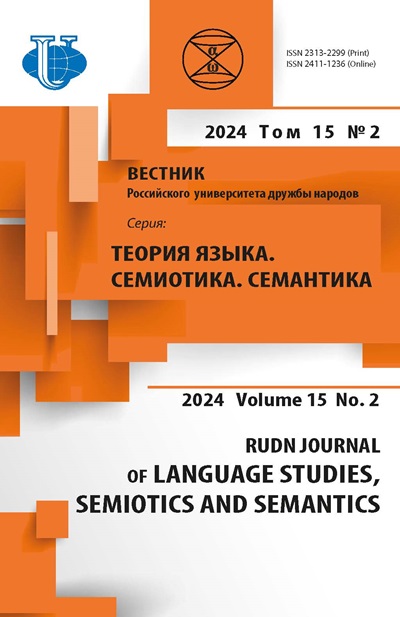ABOUT THE WAYS OF FIXING LINGUISTIC AND CULTURAL INFORMATION IN THE DAHL’S EXPLANATORY DICTIONARY
- Authors: Zgirovskaya O.G1
-
Affiliations:
- Moscow Polytechnic University
- Issue: Vol 8, No 3 (2017)
- Pages: 758-766
- Section: Articles
- URL: https://journals.rudn.ru/semiotics-semantics/article/view/17037
- DOI: https://doi.org/10.22363/2313-2299-2017-8-3-758-766
Cite item
Full Text
Abstract
The article investigates the category of “value” in the structure of lexical meaning of words and methods of its fixation in dictionaries as a semantic component. It is relevant to study the ways of cultural lexicography in the “Explanatory Dictionary of the Living Great Russian Language” of V.I. Dahl, because it included not only the linguistic information about words, but also cultural and ethnolinguistic information about the life of the people. The subject of the study was national-specific images, categories and cultural realities, the object was the cultural component in the structure of the lexical meaning of the word. The work was conducted using the method of component analysis based on the decomposition of lexical meaning at the minimum semantic components. One of the main tasks that must be solved is the development of a theoretical approach to culture in its interaction with lexicography. The purpose of this article is to identify the essence of cultural infor-mation in the dictionary and the ways of its introduction into the dictionary entry. Interpretation of zoonyms in the “Explanatory Dictionary of the Living Great Russian Language” of V.I. Dahl was analyzed and the classification. The results can be used both for the inclusion of cultural information in traditional dictionaries (explanatory, dialectal, phraseological, etc.), and for creating dictionar-ies that directly capture the cultural elements reflected in the language (linguocultural, linguistic, language dictionaries, etc.). The analysis revealed that the most important ways of fixing national-specific compo-nents are the implicit ways (paremias, idioms, figurative meanings for the name of the person). Hierarchy of values prevailing in the minds of speakers is reflected in the language and culture through these im-plicit components.
About the authors
Olga G Zgirovskaya
Moscow Polytechnic University
Author for correspondence.
Email: olga.slovo42@yandex.ru
Zgirovskaja Ol'ga Gennad’evna, graduate student of Department of Russian Language and Stylistics Faculty of Publishing and Journalism, Moscow Polytechnic University; Interests: lexicology, lexicography and cultural linguistics
Bolshaya Semenovskaya str., 38, Moscow, 107023References
- Bogacheva, G.F. (2013). Lexical meaning as an object dictionary interpretation. Moscow: FLINTA. (in Russ).
- Brileva, I.S., Vol'skaja, N.P., Gudkov, D.B., Zaharenko, I.V. & Krasnyh, V.V. (2004). Russian cultural space: Linguaculturelogical dictionary. Moscow: Gnozis. (in Russ).
- Dahl, V.I. (1978) The Explanatory Dictionary of the Living Great Russian Language: in 4 vol. Moscow: Russkii yazyk. 1978. Vol. 1. (in Russ).
- Morkovkin, V.V. & Morkovkina A.V. (1997). Russian Agnonyms (Words that We Do Not Know). Moscow: The Pushkin State Russian Language Institute. (in Russ).
- Morkovkin, V.V. (2001). About dictionary lexicology. Russian Language Abroad, 2, 32—38. (in Russ).
- Morkovkina, A.V. (1993). Russian Agnonyms n theoretical and applied examination [dissertation] The V.V. Vinogradov Russian Language Institute of the Russian Academy of Sciences. (in Russ).
- Nikitina, S.E. (2013). Confessional cultures in their territorial versions. Moscow: The Heritage Institute. (in Russ).
- Prokhorov A.M. (Ed.). Value // Bol'shoi entsiklopedicheskii slovar'. URL: http://dic.academic.ru/ dic.nsf/enc3p/319990 (in Russ). (accessed: 06.10.2016).
- Vinogradov, S.N. (2007) On the linguistic understanding of the value. Russkaya slovesnost' v kontekste kul'tury, 93—97. (in Russ).













